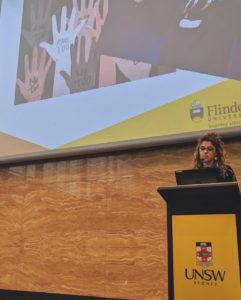
Psychologist/Postdoctoral Researcher
College of Education, Psychology and Social Work
Thesis ‘Trying to reconcile when we don’t see eye to eye: The impact of divergent narratives on reconciliation’
Sharing her reflections and insights on what this award means;
The lighthearted response is that this award is a very nice piece of evidence against the imposter syndrome that I (along with every other PhD student, and probably postgraduate student) battle against on a regular basis.
The serious response is that this award represents not just my own hard work, but also the support of a community of people that include my family, my peers, mentors, and my supervisors Assoc Prof Lydia Woodyatt and Prof Michael Wenzel.
The intellectual/academic difficulty of completing a PhD is only one piece of the challenge. I was able to complete my PhD, to a standard that resulted in this award, in large part due to the dependable support system that I have around me.
A highlight of my time at Flinders University is crossing paths with my supervisors.
It is so helpful to have mentors that recognise and invest in your skills and potential, and know the necessary stepping stones that will get you to where you want to be.
They’re also just pretty great people.
First, Lydia and Michael’s research interests aligned with my own. Second, they were people whom I felt comfortable approaching if I didn’t understand something, felt lost, or was struggling.
In hindsight, I think the importance of those two things actually go in the reverse order (your supervisory relationship is probably more important than the fact they share interests with you).
I’m most proud of the diverse skill set that I possess as a consequence of completing a Clinical PhD in psychology.
It meant that I completed my training as a clinician alongside completing a PhD in psychology. Therefore, I developed skills in clinical practice, qualitative and quantitative research, conference presentation and translating research to the real world.
Being a trained psychologist ensures that I regularly reflect upon the application of my research. Vice versa – being a trained researcher ensures that I regularly draw upon the best available evidence in my clinical practice.
PhDs and where are you now;
My advice if you have been accepted to a PhD program or you are thinking of applying, you are likely to be a person who has high expectations of yourself.
It’s helpful to be aware of those tendencies and put plans in place as to how you will keep those in check, as they will absolutely be tested by completing a PhD.
It’s also helpful to think about why you want to do a PhD – doing it for the challenge/achievement is unlikely to sustain you.
There needs to be a genuine love of learning and passion for your field.
Throughout my undergrad, I had no plans to study a PhD. I was going to become a psychologist. However, by completing the mandatory Honours research year, I realised that I was well-suited to gathering information, making sense of that information, and writing it up.
I chose the field of psychology (specifically social psychology) because I’ve always wanted to contribute something that might result in some good for how people relate to one another and themselves.
I am now a part-time child psychologist (not based at Flinders) and a part-time postdoctoral researcher here at Flinders.
My research contributes to knowledge of barriers to interpersonal conflict resolution (think restorative justice, mediation, couples’ counseling).
Victims and offenders have different perspectives of transgressions, and that creates problems when we try to bring them together to reconcile.
By identifying these barriers, my research gives us some ideas as to how we might be able to develop future interventions that improve victim-offender interaction.

